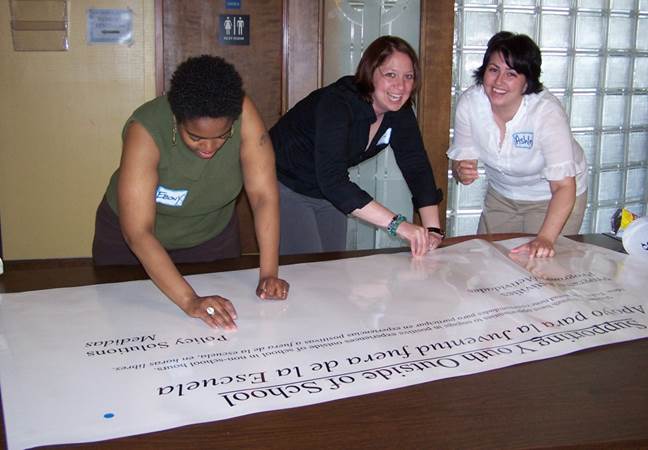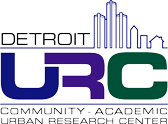Advocating for Policy Change Manual Overview
Welcome to the Detroit Community-Academic Urban Research Center's Policy Training Manual
The Advocating for Policy Change Manual is a hands-on training curriculum and toolkit to enhance the capacity of diverse groups to engage in policy advocacy to build healthy and equitable communities. Examples of topics covered in the manual include: powermapping, choosing policy goals, designing a policy-advocacy campaign, and using communications for policy change. The manual is designed for use by experienced, collaborative trainer teams to adapt to the learning needs and issues of each community. These materials were initially developed in 2007 by Detroit Urban Research Center (Detroit URC) community and academic trainers, with guidance from PolicyLink. PolicyLink is a national research and action institute advancing economic and social equity by creating sustainable communities of opportunity that allow everyone to prosper. This manual was developed as the core of a successful policy advocacy capacity building approach that combines interactive trainings, technical assistance, and ongoing support to Detroit community groups to strengthen policy advocacy skills and engage community voices to impact policy change. Since then it has been further developed and carried out with community, academic, and professional groups and individuals working together for policy change.

Topics Covered
The training manual consists of six modules that cover core content and skills needed to conduct a successful policy advocacy campaign. The following modules are contained in this manual:
- What is Policy? Moving From Community Issues to Policy Solutions
- Using Our Power - Power Mapping
- Choosing Strategies for Winning Policy Change
- Designing a Policy Advocacy Campaign
- Using Our Voices: Preparing to Talk with Policy Makers
- Choosing the Right Policy Goals
How to Use This Manual
Each module of this manual is designed for use by a team of co-trainers with experience in interactive training and group facilitation. This module can be conducted as a stand-alone training workshop or can be combined with other modules into a customized training to meet the needs of the organization and community you are working with. Each training module includes a PowerPoint presentation with a brief interactive talk on the core topic or skill, a small group activity using real-life examples, and a facilitated discussion to apply what was learned and identify next steps. Supplemental materials are provided, as well as customizable templates to create your own.
Each module contains the following materials, provided online and as downloadable files that can be adapted for your workshop participants:
- Module goal and learning objectives
- Customizable PowerPoint slides
- Activity instructions, materials, and handouts
- List of materials needed
- Advance preparation instructions for trainers
- Additional resources related to each module
Planning and Customizing
This training curriculum is designed to be customized for the specific community in which it is presented, building on community strengths. To use these modules most effectively, please consider the following:
- Adapt the introduction slides to reflect the organization(s) providing the training.
- Include community members who are experts on the community and/or policy area as part of the training team. The success of this program comes from drawing on this wealth of experience.
- Customize the photos in the module presentation to reflect the community and policy focus of the group participants.
- Develop policy scenarios that match the priority issues the community wants to address.
- If participant group is working on a specific policy issue, attend a group meeting to begin to establish a relationship, get a better understanding of the participants, and prepare the group for the upcoming workshop.
- Build on community strengths and resources, highlight individuals’ skills and knowledge, draw on social networks and relationships, and connect with existing community-based organizations.
Additional Resources
- Sample ice breakers that can be used at the beginning of each workshop to introduce the workshop participants to each other and trainers, begin to build trust among workshop participants, and engage workshop participants in the materials. We have provided examples here, or perhaps you have ones that have worked well for you in the past.
- Sample evaluation questionnaires for your reference, however, these materials do not comprise a comprehensive evaluation plan. You may need to adapt or supplement these materials to accomplish your evaluation goals.
- Publications related to Detroit URC policy advocacy training
Attribution
When using the Advocating for Policy Change curriculum materials in any form, clear attribution is expected. The Advocating for Policy Change curriculum contains materials developed by the Detroit Urban Research Center and some resources originally developed or copyrighted by others. These items are used with permission and the original source is clearly identified. Advocating for Policy Change manual users may duplicate and use items as they appear in the curriculum for future policy advocacy trainings, with acknowledgement to the original author/source using the same citation as provided on the Advocating for Policy Change materials.
Relevant Publications
Coombe, et al. 2017; Cheezum, et al. 2013; Israel, et al. 2010 (add full citations)



